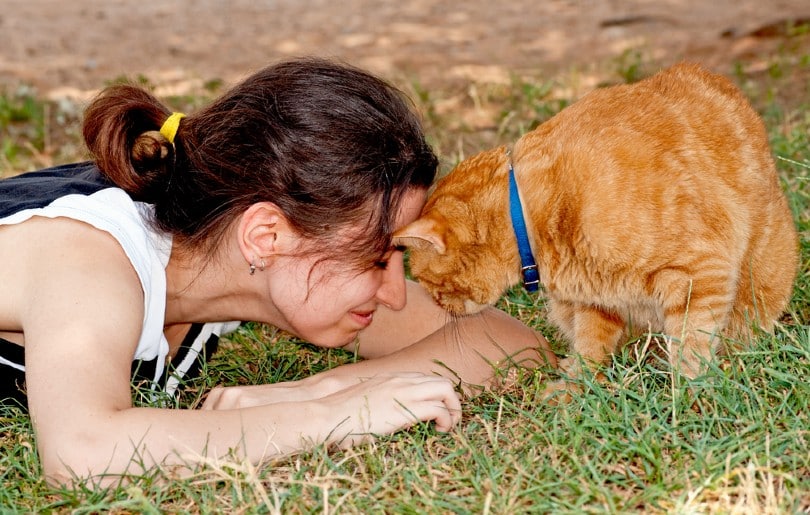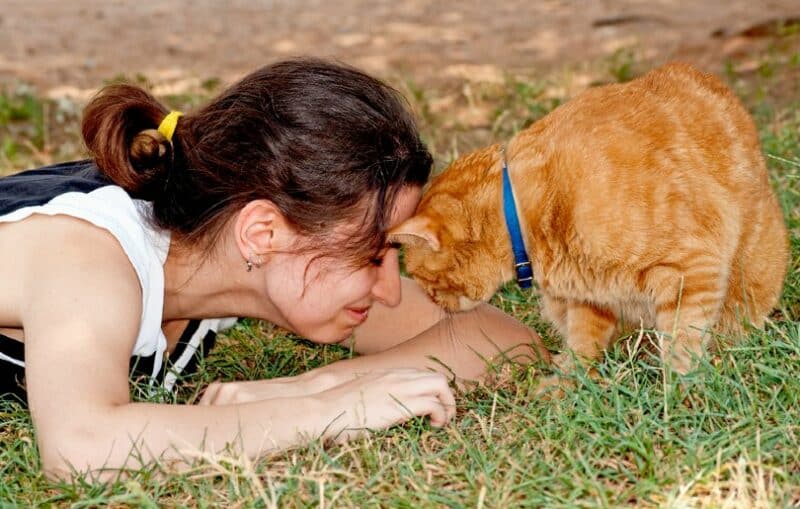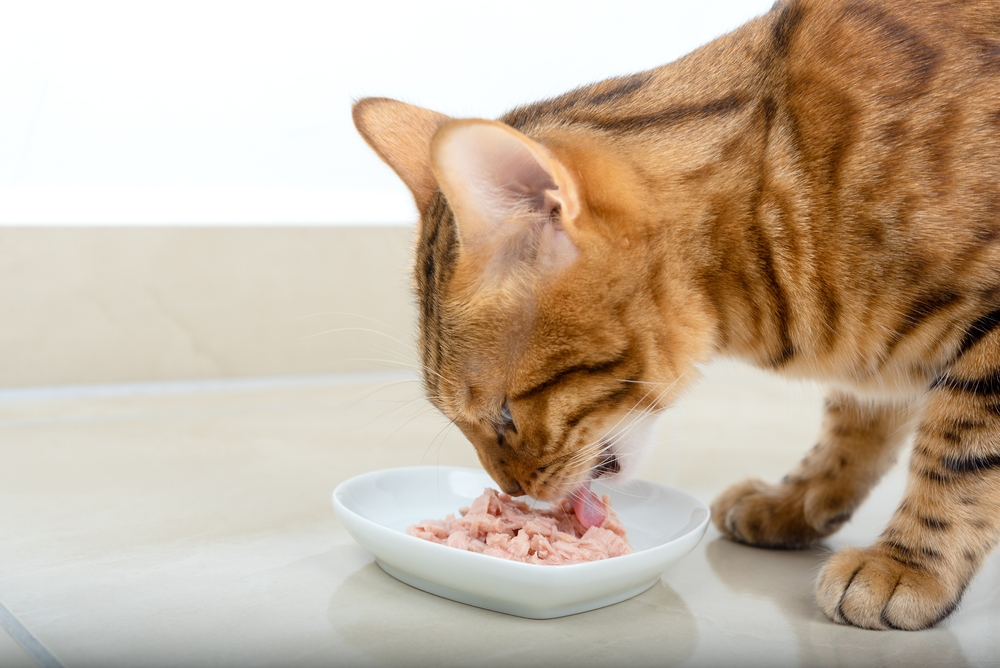Cats show their affection in funny ways, including rubbing or head-butting you or other pets. They like to rub or bump their head and faces against objects to mark their scent and show love.
If your cat is pressing their head against a wall or object, however, it can be a cause for concern. Learn the difference between affectionate head rubbing and head pressing and what you should do about it below.
Why Do Cats Rub Their Heads on Everything?
Cats have scent glands on their cheeks and heads, which they can deposit to provide other cats with information about them. They can leave their scent on you, the family dog, furniture, and more to establish their territory, create familiarity, and much more, which is one of the reasons your cat likes to rub their face and head on you.
Head rubbing or head butting—which is called “bunting”—is also a sign of bonding. In the process of transferring their scent, your cat is claiming you as a “safe zone” that they trust. Typically, this is a gentle head butt followed by a rub or simply a rub.
However, it’s important to differentiate between bunting and head pressing, which is a sign of an underlying disease.
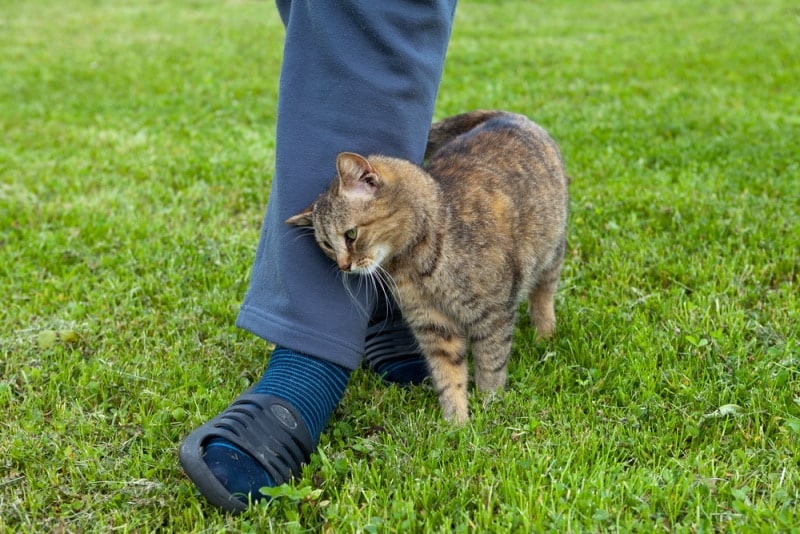
What Is Head Pressing?
Head pressing is when a cat presses their head against a wall or another object without a clear reason. Unlike the headbutt or rub, they will press their head into the object compulsively and may seem confused or disoriented. This is a sign of an underlying disease.
Head pressing is not a disease in itself but an indication of one. You may notice other disturbing signs, including:
- Abrupt behavioral changes
- Vision changes
- Compulsive meowing, often for no apparent reason
- Pacing
- Circling
- Poor coordination
- Poor reflexes
- Disorientation
- Seizures
Causes of Head Pressing
Head pressing is a sign of issues with the nervous system. This can be caused by:
- Encephalitis: This is an inflammation of the active tissues of the brain.
- Metabolic disorders: Metabolic disorders that cause too much or too little mineral concentration in the blood can cause neurological signs like head pressing.
- Infection: Nervous system infections can cause head pressing.
- Liver shunts: If the blood vessel leading to the liver goes to the heart instead, bypassing the liver, the body can’t filter out toxins effectively, which may lead to signs like head pressing.
- Advanced Kidney Disease: advanced stages of kidney disease can affect the nervous system, leading to head pressing sometimes.
- Toxicity: Cats can eat poisonous substances like certain plants, household cleaners, or medications, leading to toxicity and neurological signs.
- Traumatic brain injury: Brain injuries in cats can be caused by seizures, heart disease, or accidents.
- Tumors: Though somewhat rare, brain tumors can occur in cats and may cause neurological signs.
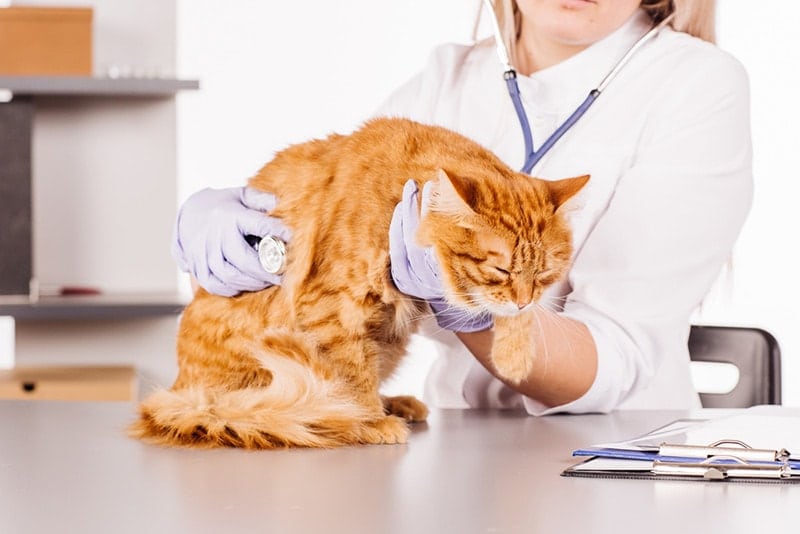
Treatment of Head Pressing
If you notice head pressing, especially combined with other signs of underlying disease, it’s crucial to schedule an exam with your vet. Depending on the possible cause, your vet may check your cat’s vision, screen for infectious disease, check blood values, and test urine. More advanced testing, such as a CT or MRI, may be needed to check the brain.
Head pressing is not a disease in itself but a sign of one. Treating head pressing relies on treating the underlying cause, which can vary.
Unfortunately, most of the causes of head pressing can be very serious. Your vet will be able to help you determine your best treatment options and prognosis.

Conclusion
Head butting or head rubbing is an odd and endearing behavior that many cats use to claim you as their own and show affection. However, head butting can be confused with head pressing, which is a concerning sign of possible underlying diseases. If you notice head pressing, it’s important to schedule an exam with your vet as soon as possible.
Featured Image Credit: Sari ONeal, Shutterstock

